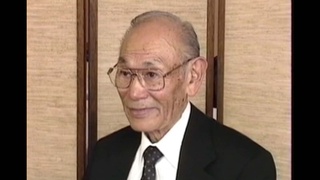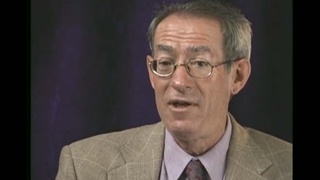Interviews
Teaching at the military language school during World War II
My Japanese was quite good in terms of writing and so forth. One of the interesting assignments I got when I was teaching at Fort Snelling was I taught some, in this Japanese language school, I taught some English. The army had drafted Kibei who knew more Japanese than English and they were a valuable resource because we lacked mainly people who could read Japanese. But then these people's English was limited, so they had a difficult time in translating. So here I am, teaching English grammar -- [laughs] -- in this language school. It was quite an experience. And, of course, I only taught the elementary Japanese.
But then I got selected to go to Officer Candidate School. There was, when I look back, segregation in the army, because the 442nd was segregated. The 100th infantry battalion preceding the 442nd was made up of draftees of Japanese descent before Pearl Harbor.
And the language school, although we had a mixed group, there was Mr. Boggs, a haole man in our class and there were some Koreans and others, but they also had at Camp Savage, special classes for Caucasian soldiers. And these were very bright language specialists. Lot of 'em had PhDs in French or Spanish or German and a good pedigree. You know, Yale, Harvard, University of Michigan, and they had a program which was quite different from ours, but once a week in the afternoon, since they wanted the haole soldiers to hear Japanese, they had some of us meet with them, one-to-one. And we had to speak Japanese to them.
Date: March 19, 2004
Location: California, US
Interviewer: Mitchell Maki
Contributed by: Watase Media Arts Center, Japanese American National Museum.
Explore More Videos

Manhunt
(1919 - 2005) Challenged the constitutionality of Executive Order 9066.

The Final Verdict
(1919 - 2005) Challenged the constitutionality of Executive Order 9066.

The Kids and Japanese Language (Japanese)
(b. 1937) A war bride from Yokohama

Father’s will to have Japanese education
(b. 1922) Canadian Nisei who was unable to return to Canada from Japan until 1952

First learning about the incarceration experience in college
(b. 1955) Lawyer


Reasons for conformity and competitiveness in Gardena, California
(b. 1946) Lawyer


Search of family home by the FBI following the bombing of Pearl Harbor
(1937 - 2021) Teacher

Not recognizing father after reunion at Crystal City, Texas
(1937 - 2021) Teacher

A child's memories of activities at Crystal City, Texas
(1937 - 2021) Teacher

Hearing about Pearl Harbor
(b. 1921) Nisei veteran who served in the occupation of Japan


Traveling to Manzanar
(b. 1921) Nisei veteran who served in the occupation of Japan

Victory Corps Work during World War II
(1925 - 2018) Nisei educator from Hawai‘i

Discover Nikkei Updates


June 25 (US) | June 26 (Japan)
Featured Nima:
Stan Kirk
Guest Host:
Yoko Murakawa

See exciting new changes to Discover Nikkei. Find out what’s new and what’s coming soon!
